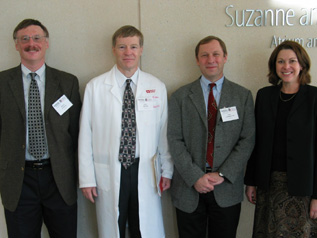 |
From left, Arnold Bayer, M.D., Philip Smith, M.D., Barry Kreiswirth, Ph.D., and Alison Freifeld, M.D. |
“There is excellent research being done in infectious diseases and microbiology at UNMC, Creighton and other University of Nebraska campuses,” Dr. Smith said. “But researchers at UNMC and Creighton do not always talk to each other and infectious disease researchers do not always talk to people doing related research in the pathology/microbiology departments.
“The conference gave regional researchers a chance to hear about progress being made regionally in infectious disease and microbiology research, to exchange ideas and to make contacts,” he said.
The conference presenters included Jason C. Bartz, Ph.D., assistant professor, Creighton University Medical Center (CUMC) department of medical microbiology and immunology; Arnold S. Bayer, M.D., professor of medicine, UCLA School of Medicine and associate chief of infectious diseases, Harbor-UCLA Medical Center, Torrance, Calif.; Alison G. Freifeld, M.D., associate professor, UNMC department of internal medicine-infectious diseases; Howard E. Gendelman, M.D., professor and chair, UNMC department of pharmacology and director, Center for Neurovirology and Neurodegenerative Disorders; Thomas J. Jerrells, M.D., professor, UNMC department of pathology and microbiology; and Barry N. Kreiswirth, Ph.D., director of PHRI Tuberculosis Center at the Public Health Research Institute, Newark, N.J.
The conference topics represented new or emerging infectious diseases, such as mad cow disease, tularemia and staphylococci. Tularemia is of increasing interest as a bioterrorism agent. Staphylococci have become dangerously resistant to antibiotics lately – transplants are often limited due to difficult infectious complications. Dr. Bayer gave the internal medicine grand rounds luncheon presentation on “Aspirin and Staphylococcal Pathogenesis.”
The conference also was an opportunity to showcase some of UNMC’s major developments in research such as Dr. Gendelman’s work on HIV of the central nervous system and HIV vaccines; UNMC’s bioterrorism defense efforts in general; and UNMC’s leadership in transplantation.
“Infectious disease specialists and microbiologists work on the same problem from different angles and can benefit from the exchange of ideas,” Dr. Smith said. “The clinical infectious disease doctor is involved in the diagnosis, treatment and prevention of difficult, resistant or recurrent infections. They depend on the microbiology researcher to develop new and better laboratory tests for identifying the specific infection and more effective treatments, such as new antibiotics and vaccinations.”
The conference planning committee included Dr. Smith; Paul D. Fey, Ph.D., associate professor, UNMC departments of internal medicine-infectious disease and pathology and microbiology; Richard V. Goering, Ph.D., professor and interim chair, CUMC department of medical microbiology and immunology; Gary L. Gorby, M.D., interim chief, CUMC department of medical microbiology and immunology-section of infectious diseases; and Joan A. Husted, program associate for UNMC’s Center for Continuing Education.
“We felt the conference was a great success – both in terms of attendance, evaluations (the speaker evaluation scores were remarkably high) and the exchange of ideas among researchers at the conference,” Dr. Smith said.
“Many evaluation comments expressed the hope that the conference will become an annual event.”